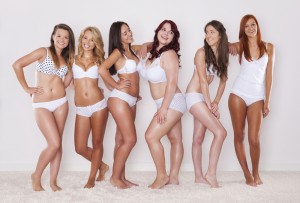Body image issues are at the centre of many psychological difficulties, including eating disorders, depression, social anxiety, and those seeking reconstruction surgery. There is a difference between what is considered a ‘normal’ level of body dissatisfaction (i.e., some difficulty accepting particular aspects of one’s appearance) and a body image problem. Body image refers to how we see ourselves versus our objective appearance. Individuals with a body image problem have a persistently negative (and often biased) view of one or more aspects of their appearance to the point where their mental, emotional, academic (or work) and social functioning is affected.
This negative preoccupation with the body can be associated with high levels of worrying and distress about that particular ‘defect’, which can lead to avoidance in wearing particular kinds of clothing, hair-styles, environments and social interactions. While many individuals who are preoccupied with a particular part of their body may feel privately ashamed of their distress, others seek increasing levels of reassurance from others about their appearance.
What is Body Dysmorphic Disorder (BDD)?
Body image difficulties at their most severe may warrant a diagnosis of Body Dysmorphic Disorder (BDD). Symptoms of BDD include but are not limited to a preoccupation with either a minor or imagined flaw that is felt to be excessive and uncontrollable. It can often feel to the person like Obsessive Compulsive Disorder (OCD), with intrusive thoughts about the ‘horrible defect’ on their body and associated compulsions to check their body, get reassurance about it (e.g., “does my nose look big?”) or do something else to ‘neutralise’ or get rid of the thoughts (e.g., “rub their nose”). It is very common for individuals with BDD to have had histories of plastic surgery for the purpose of ‘fixing’ the (non-existent) defect. Researchers for BDD are increasingly recommending that plastic surgeons assess their patients for BDD before performing surgery, given that having surgery does not improve BDD or resolve people’s dissatisfaction with their appearance.
What about men?
Men with body image issues often seek therapy for what initially is a non-body-related issue (e.g. performance at school or work, anxiety, stress or a relationship break up). However, underlying some of these issues can be ‘musclerexia’, a descriptive term in which men (or women) are excessively dedicated towards an ‘ideal’ body. This drive is usually underpinned by anxiety. The person may spend excessive time at the gym, wake during the night to take a protein supplement, become very agitated upon missing a workout and take enhancing drugs (including steroids) to try to achieve the ‘ideal’ body – one with minimal body fat and hair, large amounts of muscle and a ‘V’ shape on their lower abdominal / pelvic region.
What other problems commonly occur alongside (or drive) body image difficulties?
Given the overlap between symptoms of anxiety (worry, reassurance-seeking, checking, intrusive thoughts) and body image difficulties, people seeking therapy for difficulties with their body image also typically experience social anxiety – worry about being negatively judged by others, thoughts and feelings about being socially awkward, and social withdrawal or avoidance. With increased avoidance of social situations individuals can also develop Depression.
Perfectionism and unrealistic standards are also common drivers of body image difficulties. Individuals typically value being perfectionistic, believing it to be helpful (rather than a hinderance). Disordered eating, such as Anorexia or Bulimia Nervosa can also result from body image difficulties.
Finally, to manage their anxiety in social situations, many individuals with body image concerns may drink excessively (or binge drink) to reduce their anxiety. The irony is that these individuals usually berate themselves the next day for getting so drunk and ‘out of control’ that they cannot remember events. Significant worry about ‘what happened’ (i.e., what they might have done or said while intoxicated) then results.
The impact of body image difficulties
Although a person with body image difficulties may be objectively very attractive, the individual can believe they are defective (or unspeakably hideous) to the extent that they can’t interact with others (from fear they might be ridiculed or humiliated). This can cause those with this issue to begin to seclude themselves or have trouble in social situations.
Individuals with body image difficulties also encounter problems with managing other emotions and are typically averse to conflict. Some avoid close relationships. For those already in close relationships, body image difficulties are also associated with shame and secrecy – because of the fear of negative judgment individuals may not reveal their concerns about their appearance for fear of appearing vain or superficial or fears or being rejected.
Finally, for those individuals dedicated to the pursuit of an ‘ideal’ body image, lots of money can be spent on surgery, cosmetics, particular foods and gym memberships.
Therapy for Body Image Difficulties
Evidence-based therapies for body image difficulties and Body Dysmorphic Disorder include Cognitive Behaviour Therapy (CBT), Dialectical Behaviour Therapy (DBT), and Acceptance and Commitment Therapy (ACT). Strategies from these treatments include:
- Building behavioural strategies to manage disordered conceptualisations of the body (e.g. reducing body checking and reassurance seeking)
- Understanding past and present unhelpful behavioural patterns
- Relational skills
- Anxiety management
- Adjustment of unhelpful thinking (to change appearance preoccupation and fusion with negative self-judgments)
- Reduction of avoidance behaviours
- Building a realistic appraisal of the body and other ‘identity’ and ‘self-esteem’ factors
- Developing a resilient and healthy self-identity
Where to go from here?
If you would like to find out more about our treatment for body image issues and body dysmorphic disorder, or to book an appointment with one of our clinical psychologists who provides treatment for these conditions, please make an enquiry or call the clinic on 02 9438 2511.

